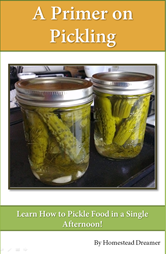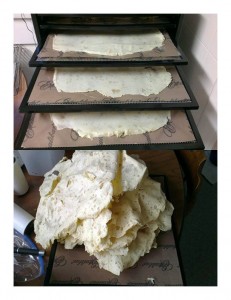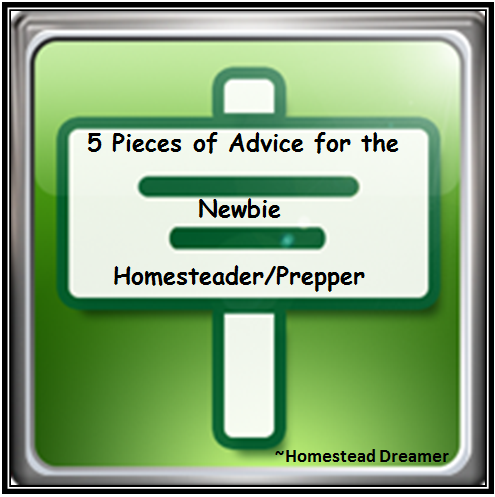When I first started on this whole self-sufficiency/homesteading lifestyle, I was rather alone. I didn’t have to many people to talk to about it that I felt would not judge me for being a “doomsday prepper” or off my rocker, so to speak. It was hard to get advice for the newbie (me!).
I spent hours upon hours online trying to get good, solid information. Here I am, a year and a half later and I have more projects going on than I can keep track of! The journey has been completely worth it so far and it is very addicting. The more you accomplish on your own, the more you want to do! If you are just starting out on the path of self sufficiency, prepping, or homesteading; I have 5 bits of advice for you.
- Researching and gathering information is the most important step. Without information, you are absolutely doomed to failure. I suppose if you have infinite resources at your fingertips to learn solely by trial and error, you would eventually succeed. The point is, information is the key and power you need to make the best choices. Some people may groan about the idea of researching but if you think about it, reading this article is already doing ‘research.’ I have read and reviewed many books that are on both prepping and homesteading, even fiction ones! Dystopian fiction can actually help you imagine what you would do in similar situation, not to mention help you consider areas you need improvement in.
- Practice. Next to researching, practicing the skills you have learned until you are at least proficient is crucial to success whether you are trying to grow all of your vegetables for a year or focus more on survival tactics. I have spoken with people who say, “When I need the information, I will just look it up!” That is a great idea but not very practical. When have you ever seen a farmer out in the field with a Kindle, reading up on how to sow seeds? How about in a scary urban situation such as a looter at your door, wanting your food? Do you think they will wait a moment while you Google search how to stop a looter? Practicing does more than help you remember how to do something; it also programs your brain to be able to perform without really thinking about it. When you first started driving, you actually thought about putting your foot on the break before putting it into gear and then the gas pedal. How about now? I bet you are like most people and are on auto pilot, thinking about the upcoming day or the schedule for next week instead on where your foot should be. Practice. Then practice some more in different conditions!
 Learn how to pickle food in a single afternoon! “A Primer on Pickling” is now available on Kindle for less than a latte!
Learn how to pickle food in a single afternoon! “A Primer on Pickling” is now available on Kindle for less than a latte!
- Reach out to others, even if it is only via the internet. After about 4 months of playing the lone wolf, I got sick of it and started to look for groups of like minded people who could answer questions, share ideas, and perhaps network with. If you read an article somewhere and have questions, ask the author! Generally speaking, most people who run blogs like mine or even professional journalists love to hear from people who read their work. Speaking from personal experience, I have gotten some of my best ideas from talking to people who follow my adventures. If I do not have an answer to a question, I will help them find one. When you reach out there, you will end up learning more in a much quicker fashion and who knows? You may end up with some new friends in the process. 🙂
-

“Instant Mashed Potatoes” – A total failure! Give yourself permission to mess up. You are going to mess up. Sometimes it may seem that is all you do! For some, that is the quitting point. For others, that is fuel for the fire. When I royally botch some project I always end up laughing at myself and consoling myself with the certainty that I know now how not to do whatever it is I am working on. Tried to make my own ‘instant’ mashed potatoes once. I cooked the taters, mashed ’em and fired up the dehydrator. The result were these potato sheets that you could cut steel with, I swear! I tried to break it up (powder it) in a food processor and it not only scratched the sides of the container so badly that you couldn’t see through it anymore; it also dented the blades inside, overheated the motor and was a complete and utter failure. I was upset that the money I spent on the processor was wasted. I grumped around for the rest of the day and was generally not pleasant to be around. The next day, I laughed as I told the story at work because it is all a learning curve. In case you are curious, I have not ventured that particular project since.
- Every failure is a challenge to overcome. This ties in with #4 but I wanted to make it a separate bit of knowledge because there is a point I want to make. Say you try a project many times over and simply cannot grasp the concept or make the recipe work right, or just can’t seem to make it all come together. At some point you need to admit when “project X” is just not your cup of tea or beyond your skill set and throw in the towel on doing it yourself. The bottom line is no one can do it all! That is why we have communities and different jobs and interests. We need each other to be able to do more than merely survive. The human existence thrives on the exchange of ideas and feelings and working together. Maybe you are a garden god when it comes to growing tomatoes but can’t seem to grow spices to save yourself. Your neighbor may have the herb garden to beat all and needs those tomatoes. The point is, even if you fail at something over and over yourself, it does not mean the end. The challenge is still there and you can still succeed; you just need to find the solution!
Additional Information
Some weeks back, I wrote an article that detailed the sites I personally go to for information on various projects and areas of homesteading, prepping, and being more self sufficient. I highly recommend them to those who are new and those with a mid-skill level. If nothing else, the ideas are wonderful!




